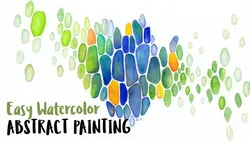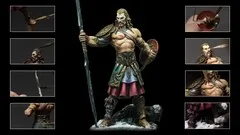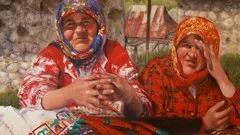
Abstract Watercolor : Easy & Colorful Painting for Beginners 
Learn to create beautiful abstract watercolor paintings with this easy and fun course! Perfect for beginners, I will guide you through the basics of watercolor techniques, from materials to color blending, painting shapes, and composition. Join me and create your own colorful abstract painting! ▼
ADVERTISEMENT
Course Feature
![]() Cost:
Cost:
Free Trial
![]() Provider:
Provider:
Skillshare
![]() Certificate:
Certificate:
No Information
![]() Language:
Language:
English
![]() Start Date:
Start Date:
On-Demand
Course Overview
❗The content presented here is sourced directly from Skillshare platform. For comprehensive course details, including enrollment information, simply click on the 'Go to class' link on our website.
Updated in [April 29th, 2023]
This course, Abstract Watercolor: Easy & Colorful Painting for Beginners, is designed to help beginners learn the basics of watercolor painting. Led by Stéphanie, participants will be guided through the fundamentals of watercolor painting, including materials, color blending, painting shapes, composition, and creating an abstract painting. By the end of the course, participants will have the skills and knowledge to create their own abstract watercolor painting.
[Applications]
After taking this course, participants can apply the techniques they have learned to create their own abstract watercolor paintings. They can use the materials they have learned about, practice color blending, painting shapes, and composing a cohesive painting. Additionally, they can use the composition techniques they have learned to create their own abstract painting. Finally, they can use the resources provided by Stéphanie, such as her Instagram and website, to further their knowledge and practice.
[Career Paths]
1. Fine Artist: Fine artists create original works of art, such as paintings, sculptures, and drawings. They may also create digital art, performance art, and mixed media. Fine artists typically have a Bachelor's degree in Fine Arts or a related field, and they often specialize in a particular medium or style. Developing trends in this field include the use of digital tools and technology to create art, as well as the use of unconventional materials and techniques.
2. Art Teacher: Art teachers work in schools, museums, and other educational institutions to teach students about art and art history. They typically have a Bachelor's degree in Art Education or a related field, and they may also have a teaching certification. Developing trends in this field include the use of digital tools and technology to teach art, as well as the use of unconventional materials and techniques.
3. Art Therapist: Art therapists use art to help people with mental and emotional issues. They typically have a Master's degree in Art Therapy or a related field, and they may also have a license or certification. Developing trends in this field include the use of digital tools and technology to help people express themselves, as well as the use of unconventional materials and techniques.
4. Art Director: Art directors are responsible for the visual style of a project, such as a film, television show, or advertisement. They typically have a Bachelor's degree in Art or a related field, and they may also have experience in the field. Developing trends in this field include the use of digital tools and technology to create art, as well as the use of unconventional materials and techniques.
[Education Paths]
1. Bachelor of Fine Arts (BFA): A Bachelor of Fine Arts degree is a great option for those interested in pursuing a career in the visual arts. This degree focuses on the development of artistic skills and techniques, as well as the history and theory of art. It is a great way to gain a comprehensive understanding of the visual arts and develop a portfolio of work. Additionally, the BFA degree is becoming increasingly popular due to its flexibility and the ability to specialize in a particular area of art.
2. Master of Fine Arts (MFA): A Master of Fine Arts degree is a great option for those looking to further their education in the visual arts. This degree focuses on the development of advanced artistic skills and techniques, as well as the history and theory of art. It is a great way to gain a comprehensive understanding of the visual arts and develop a portfolio of work. Additionally, the MFA degree is becoming increasingly popular due to its flexibility and the ability to specialize in a particular area of art.
3. Doctor of Philosophy (PhD): A Doctor of Philosophy degree is a great option for those looking to pursue a career in the visual arts. This degree focuses on the development of advanced artistic skills and techniques, as well as the history and theory of art. It is a great way to gain a comprehensive understanding of the visual arts and develop a portfolio of work. Additionally, the PhD degree is becoming increasingly popular due to its flexibility and the ability to specialize in a particular area of art.
4. Certificate in Visual Arts: A Certificate in Visual Arts is a great option for those looking to gain a basic understanding of the visual arts. This certificate focuses on the development of basic artistic skills and techniques, as well as the history and theory of art. It is a great way to gain a basic understanding of the visual arts and develop a portfolio of work. Additionally, the Certificate in Visual Arts is becoming increasingly popular due to its flexibility and the ability to specialize in a particular area of art.
Pros & Cons

Relaxing and destressing

Great information about gradients and water control

Easy to understand

Not intimidating

Improved techniques immediately

Useful technique for other paintings

Unable to post picture

Not suitable for all levels
Course Provider

Provider Skillshare's Stats at AZClass
Discussion and Reviews
0.0 (Based on 0 reviews)
Explore Similar Online Courses

Digital Illustration: Draw A Vertical Garden on Procreate iPad

Build 10 Desktop Apps with Python PyQt

Python for Informatics: Exploring Information

Social Network Analysis

Introduction to Systematic Review and Meta-Analysis

The Analytics Edge

DCO042 - Python For Informatics

Causal Diagrams: Draw Your Assumptions Before Your Conclusions

Whole genome sequencing of bacterial genomes - tools and applications

The Secret to Your Paintings Success

Painting a miniature figure PART 2


Start your review of Abstract Watercolor : Easy & Colorful Painting for Beginners